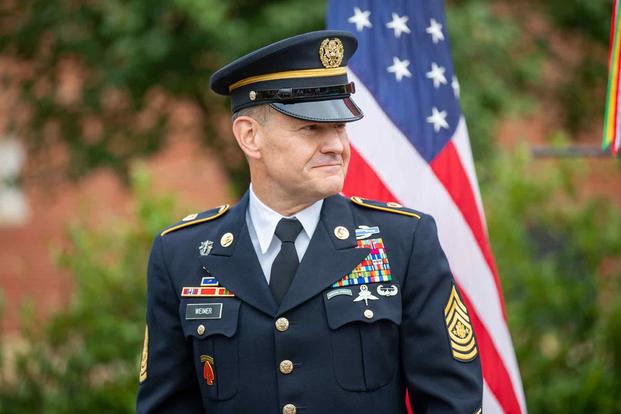Sergeant Major of the Army Michael Weimer will make his Capitol Hill debut next week as senior enlisted leaders from each service are set to testify on quality-of-life issues for troops, and he will likely have his work cut out for him.
The testimony comes at a time when the Army is beset with growing concerns, complaints and a wave of press coverage due to dilapidated living conditions for many junior soldiers, limited access to healthy food, and other issues that directly affect quality of life in the service. The other military services face similar challenges, but the Army is the largest — and often most visible — branch.
Weimer will testify Jan. 31 before the House Armed Services Committee’s military quality-of-life panel, a recently assembled bipartisan group of lawmakers eyeing the services’ accountability for issues that affect the lives of troops and their families. Enlisted leaders are likely to face tough questions about the seemingly deteriorating conditions on bases.
Read Next: Some Military Patients Left Without Heat for a Week at Texas Base During Blast of Frigid Weather
The Army has been weathering a barrage of grievances from its rank and file and media coverage of many of its barracks — often for moldy conditions particularly prevalent in the humid weather of North Carolina, Georgia and Hawaii. In some cases, soldiers with mold exposure have been hospitalized for respiratory issues.
When Weimer testifies, it will be under a cloud of problems that have publicly surfaced and been widely shared across the internet.
Soldiers frequently take their concerns about living conditions outside of their chain of command or formal reporting mechanisms. Those complaints are often made to the press, including this publication, and more frequently to social media — making them public and sometimes viral.
They are amplified by the online community U.S. Army WTF! Moments and the Army forum on Reddit — alongside newly emerging platforms such as the Hots & Cots app, which is akin to Yelp for the military and deals with barracks and dining facilities.
“Some of it is an easy button,” Kenneth Ramos, digital outreach for U.S. Army WTF! Moments, told Military.com in an interview. “We don’t hate the Army at all; we want to cut through the bureaucracy.”
Those posts regularly get thousands of views and often demand the attention of the Army.
Soldiers interviewed by Military.com shared common concerns that their leadership does not take their issues seriously or that, even when they do, leaders are often powerless to remedy the situation. Garrison leadership can get a soldier a new room, but failing infrastructure can be a persistent issue across installations. New construction is planned out years in advance.
For many soldiers, going to social media or the press is a direct mechanism to bring attention to a problem in ways junior enlisted troops otherwise have little power to do. In many cases, issues with mold or food cannot be easily solved at the unit level.
The Defense Department does have an online system to file complaints, but soldiers have raised concerns that the system is archaic and doesn’t allow uploads of photos or videos, making reporting problems more difficult.
“I know it isn’t getting fixed,” one junior soldier who recently published photos of their moldy barracks told Military.com. “It was just nice to have attention on it. Maybe it helps someone later, but it was nice to just have it acknowledged.”
Robert Evans, a former noncommissioned officer in the Army Reserve and North Carolina National Guard, designed an app called Hots & Cots in October. So far, it has more than 2,000 downloads and dozens of posts on poor-quality barracks and food.
“I wanted to find a way to try to make the military better than it currently is,” Evans said in an interview with Military.com.
But despite the barrage of media coverage and soldiers airing grievances online about the quality of Army barracks and food, the service has not articulated any plans for meaningful changes. Weimer, facing Congress, may be under pressure to outline how the service plans to move forward.
Army Secretary Christine Wormuth told Military.com in an interview in October that the service is eyeing fully funding barracks maintenance, which would add only about $300 million across the rest of the decade to the Army’s budget for basic maintenance. For years, the service has been diverting significant funds from maintenance to other priorities.
The Army held a barracks summit with key leadership in December to review potential short- and long-term plans on soldier quality-of-life issues — with barracks at the core.
But the service has not been publicly transparent about the standards it hopes to achieve. Military.com had a long-planned tour of barracks at Fort Belvoir, Virginia, meant to set an example of quality living conditions for the service. It was abruptly canceled by public affairs officials hours before the publication was set to visit the installation.
Those new Belvoir barracks, at least until December, were seen in the force as the service’s flagship living quarters for junior enlisted troops. The barracks sport dorm-style private rooms and a common area with in-room laundry machines, individual heating and air, and a kitchen. That model was going to serve as a North Star for future barracks construction and remodeling.
Quality-of-life issues served as the center of gravity in the Army in recent years, up until the change of senior leadership to Weimer and Gen. Randy George, who was confirmed as the Army’s chief of staff in September.
But the mantra of “people first,” from the service ‘s previous senior leaders — Army Chief of Staff Gen. James McConville and Sergeant Major of the Army Michael Grinston — was effectively replaced with “discipline” overnight, a term that Weimer frequently uses.
In the first notable joint message from senior leaders to the force, introducing themselves, none of the priorities of that new team included measurable goals on quality-of-life issues.
Related: The Army’s New Enlisted Leader Is All About Discipline. He Wants an App for That in Every Soldier’s Pocket.
Story Continues
Please rate this CIBA article
Vote






